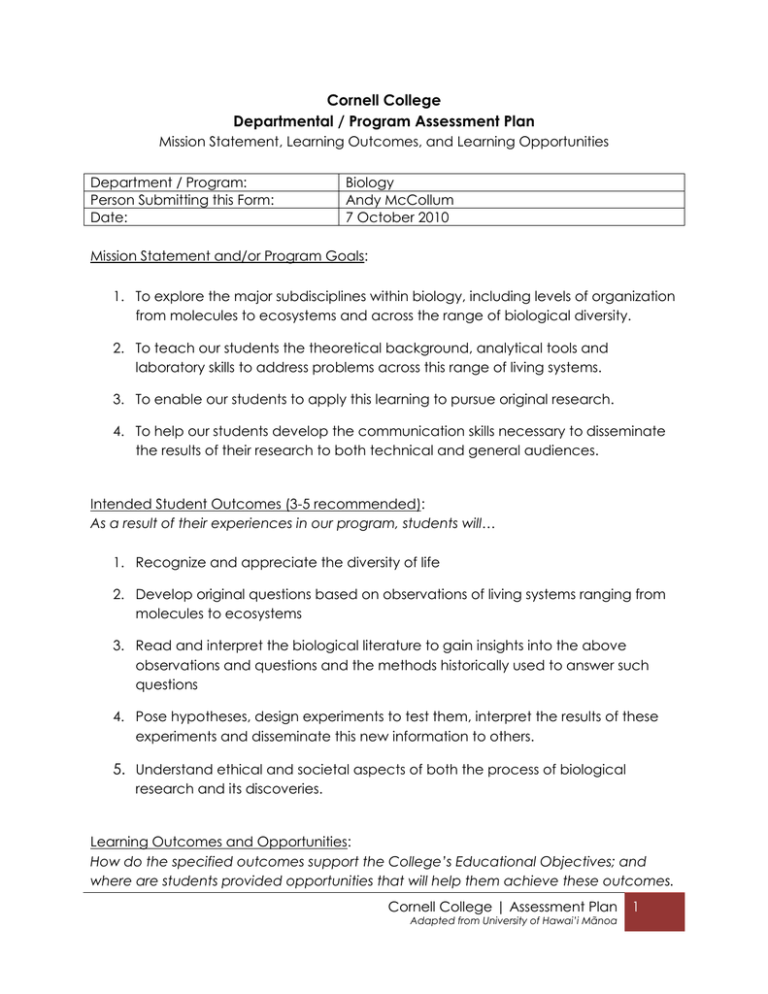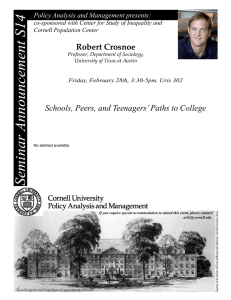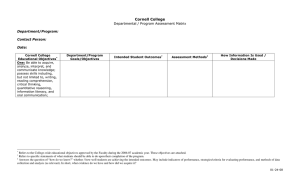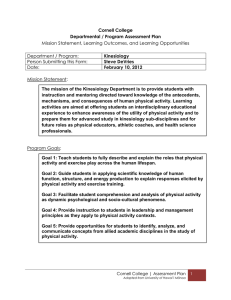Cornell College Departmental / Program Assessment Plan
advertisement

Cornell College Departmental / Program Assessment Plan Mission Statement, Learning Outcomes, and Learning Opportunities Department / Program: Person Submitting this Form: Date: Biology Andy McCollum 7 October 2010 Mission Statement and/or Program Goals: 1. To explore the major subdisciplines within biology, including levels of organization from molecules to ecosystems and across the range of biological diversity. 2. To teach our students the theoretical background, analytical tools and laboratory skills to address problems across this range of living systems. 3. To enable our students to apply this learning to pursue original research. 4. To help our students develop the communication skills necessary to disseminate the results of their research to both technical and general audiences. Intended Student Outcomes (3-5 recommended): As a result of their experiences in our program, students will… 1. Recognize and appreciate the diversity of life 2. Develop original questions based on observations of living systems ranging from molecules to ecosystems 3. Read and interpret the biological literature to gain insights into the above observations and questions and the methods historically used to answer such questions 4. Pose hypotheses, design experiments to test them, interpret the results of these experiments and disseminate this new information to others. 5. Understand ethical and societal aspects of both the process of biological research and its discoveries. Learning Outcomes and Opportunities: How do the specified outcomes support the College’s Educational Objectives; and where are students provided opportunities that will help them achieve these outcomes. Cornell College | Assessment Plan Adapted from University of Hawai’i Mãnoa 1 The College’s educational objectives include to “be able to acquire, analyze, interpret, and communicate knowledge; possess skills including, but not limited to, writing, reading comprehension, critical thinking, quantitative reasoning, information literacy, and oral communication.” In virtually all of our courses, students engage with the literature, using modern information technology to find said literature, then use the information in this literature to develop research projects, for which they must collect and analyze data, which they then present in oral or written format appropriate to the discipline. The College’s educational objectives further state that “as a result of their experiences with various methods of inquiry, graduates will recognize and apply different disciplinary and interdisciplinary forms of thinking; as a result of their experiences with a major or concentration, graduates will possess depth of understanding and research skills in at least one method of inquiry.” We offer courses designed for both majors and non-majors, though students in both categories often take both types of courses. All of our courses focus on the form of thinking characteristic of the natural sciences, and, as students progress through to our upper level courses, they develop deeper understanding until their culminating experience in BIO 485, Biological Problems, in which they must conduct a major independent research project. The College’s educational objectives also include “Integrate and transfer knowledge and skills from one setting to another.” This is the essence of the culminating experience, in which students must use the skills and knowledge they have gained during all of their studies at Cornell College to address a novel question. Finally, the college’s educational objectives include “Be cognizant of their responsibility for individual, civic, and social choices.” While not all of our courses emphasize these aspects of being a biologist, many do. In our introductory courses, we discuss ethical aspects of science in general as well as some aspects specific to biological inquiry and the use of biological information. All of our laboratory courses at least implicitly address research ethics and honest reporting of results. Curriculum Map: Use the following grid – or one of your own making – to identify where educational opportunities [e.g., courses, programs, activities, etc.] introduce (I), reinforce (R), and/or emphasize (E) the skills/abilities necessary to achieve your intended outcomes. Include all intended outcomes and educational opportunities. Cornell College | Assessment Plan Adapted from University of Hawai’i Mãnoa 2 Non Majors Courses Intended Outcome 1 Intended Outcome 2 Intended Outcome 3 Intended Outcome 4 Intended Outcome 5 Intro courses for majors (141, 142) Upper Level courses Capstone Course (BIO 485) Lab and Non-lab courses (I, E) I, E R, E, R Lab Courses (I) I R, E, R, E Lab and NonLab courses (I) I R, E, R, E, Lab Courses (I, E) I, E R, E, R, E, Lab and NonLab courses (I) I R R Assessment Priorities: Given our intended outcomes, the top 2-3 assessment priorities for our department/program are: Are our students developing an understanding of the living systems they encounter in nature? Are they familiar with the organisms, how they function, and how they interact with one another and the physical environment? Are our students learning to locate relevant biological literature, interpret it, use it to gain conceptual understanding, develop questions, and to extract appropriate methods for answering questions? In their final year, can our students design, conduct, interpret and effectively communicate original research in at least one subdiscipline of biology? Cornell College | Assessment Plan Adapted from University of Hawai’i Mãnoa 3



